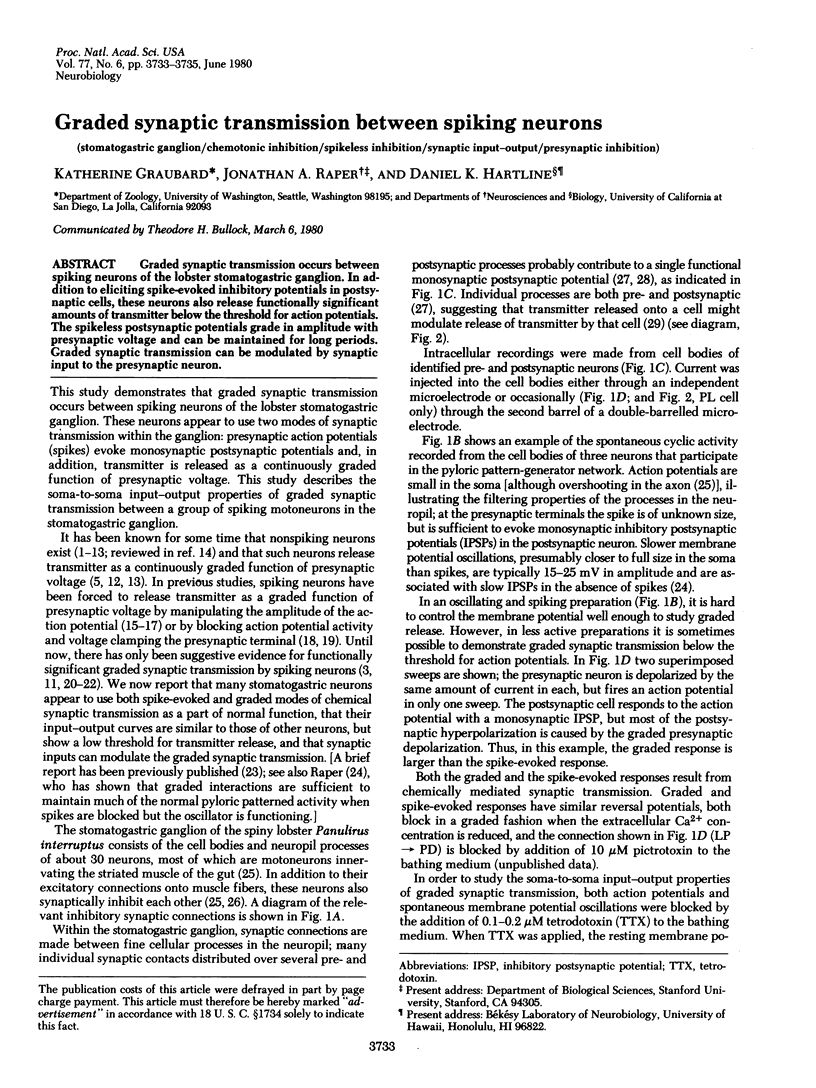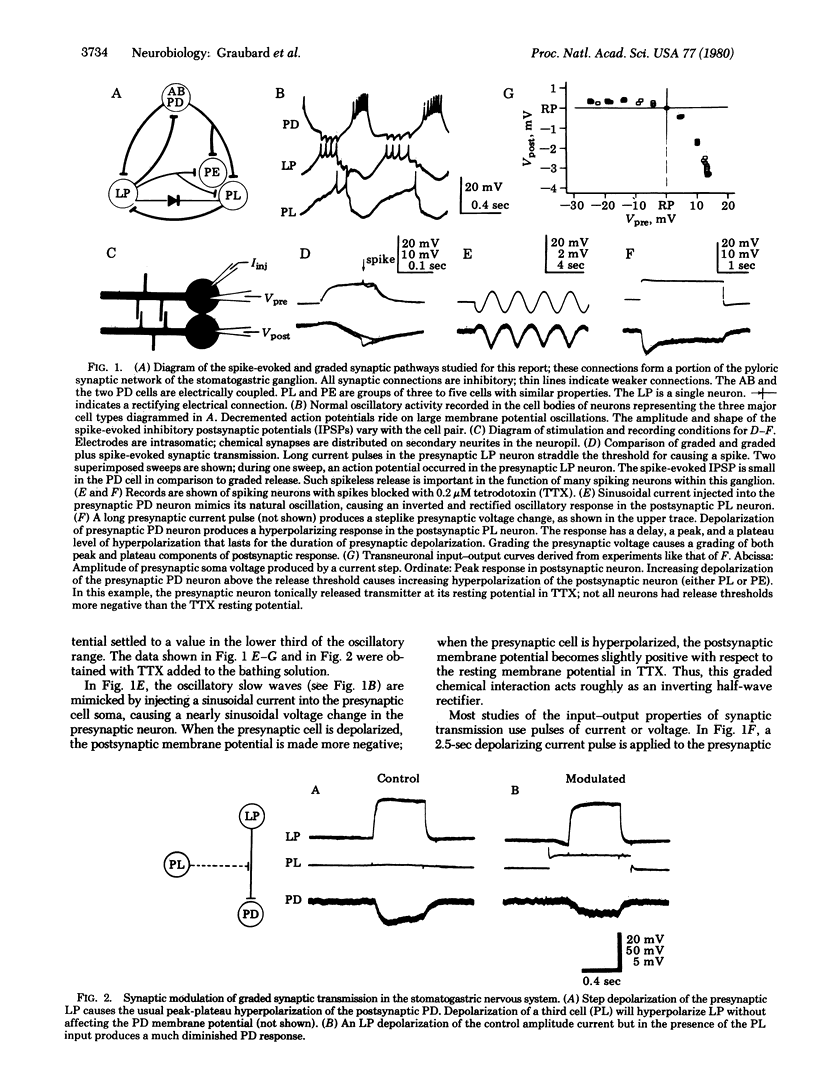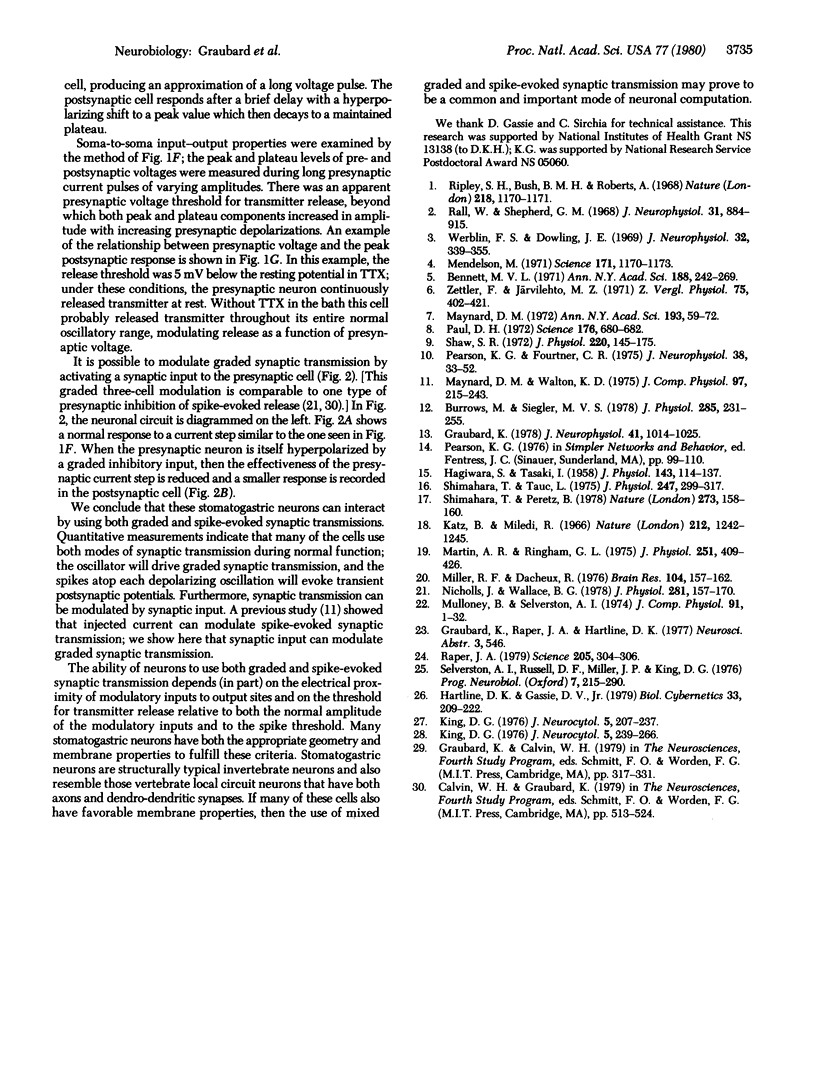Abstract
Graded synaptic transmission occurs between spiking neurons of the lobster stomatogastric ganglion. In addition to eliciting spike-evoked inhibitory potentials in postsynaptic cells, these neurons also release functionally significant amounts of transmitter below the threshold for action potentials. The spikeless postsynaptic potentials grade in amplitude with presynaptic voltage and can be maintained for long periods. Graded synaptic transmission can be modulated by synaptic input to the presynaptic neuron.
Full text
PDF


Selected References
These references are in PubMed. This may not be the complete list of references from this article.
- Bennett M. V. Electrolocation in fish. Ann N Y Acad Sci. 1971 Dec 3;188:242–269. doi: 10.1111/j.1749-6632.1971.tb13102.x. [DOI] [PubMed] [Google Scholar]
- Burrows M., Siegler M. V. Graded synaptic transmission between local interneurones and motor neurones in the metathoracic ganglion of the locust. J Physiol. 1978 Dec;285:231–255. doi: 10.1113/jphysiol.1978.sp012569. [DOI] [PMC free article] [PubMed] [Google Scholar]
- Graubard K. Synaptic transmission without action potentials: input-output properties of a nonspiking presynaptic neuron. J Neurophysiol. 1978 Jul;41(4):1014–1025. doi: 10.1152/jn.1978.41.4.1014. [DOI] [PubMed] [Google Scholar]
- HAGIWARA S., TASAKI I. A study on the mechanism of impulse transmission across the giant synapse of the squid. J Physiol. 1958 Aug 29;143(1):114–137. doi: 10.1113/jphysiol.1958.sp006048. [DOI] [PMC free article] [PubMed] [Google Scholar]
- Hartline D. K., Gassie D. V., Jr Pattern generation in the lobster (Panulirus) stomatogastric ganglion. I. Pyloric neuron kinetics and synaptic interactions. Biol Cybern. 1979 Aug;33(4):209–222. doi: 10.1007/BF00337410. [DOI] [PubMed] [Google Scholar]
- King D. G. Organization of crustacean neuropil. I. Patterns of synaptic connections in lobster stomatogastric ganglion. J Neurocytol. 1976 Apr;5(2):207–237. doi: 10.1007/BF01181657. [DOI] [PubMed] [Google Scholar]
- King D. G. Organization of crustacean neuropil. II. Distribution of synaptic contacts on identified motor neurons in lobster stomatogastric ganglion. J Neurocytol. 1976 Apr;5(2):239–266. doi: 10.1007/BF01181658. [DOI] [PubMed] [Google Scholar]
- Martin A. R., Ringham G. L. Synaptic transfer at a vertebrate central nervous system synapse. J Physiol. 1975 Oct;251(2):409–426. doi: 10.1113/jphysiol.1975.sp011101. [DOI] [PMC free article] [PubMed] [Google Scholar]
- Maynard D. M. Simpler networks. Ann N Y Acad Sci. 1972 Aug 25;193:59–72. doi: 10.1111/j.1749-6632.1972.tb27823.x. [DOI] [PubMed] [Google Scholar]
- Mendelson M. Oscillator neurons in crustacean ganglia. Science. 1971 Mar 19;171(3976):1170–1173. doi: 10.1126/science.171.3976.1170. [DOI] [PubMed] [Google Scholar]
- Miller R. F., Dacheux R. Dendritic and somatic spikes in mudpuppy amacrine cells: indentification and TTX sensitivity. Brain Res. 1976 Mar 5;104(1):157–162. doi: 10.1016/0006-8993(76)90657-0. [DOI] [PubMed] [Google Scholar]
- Nicholls J., Wallace B. G. Modulation of transmission at an inhibitory synapse in the central nervous system of the leech. J Physiol. 1978 Aug;281:157–170. doi: 10.1113/jphysiol.1978.sp012414. [DOI] [PMC free article] [PubMed] [Google Scholar]
- Paul D. H. Decremental Conduction over "Giant" Afferent Processes in an Arthropod. Science. 1972 May 12;176(4035):680–682. doi: 10.1126/science.176.4035.680. [DOI] [PubMed] [Google Scholar]
- Pearson K. G., Fourtner C. R. Nonspiking interneurons in walking system of the cockroach. J Neurophysiol. 1975 Jan;38(1):33–52. doi: 10.1152/jn.1975.38.1.33. [DOI] [PubMed] [Google Scholar]
- Rall W., Shepherd G. M. Theoretical reconstruction of field potentials and dendrodendritic synaptic interactions in olfactory bulb. J Neurophysiol. 1968 Nov;31(6):884–915. doi: 10.1152/jn.1968.31.6.884. [DOI] [PubMed] [Google Scholar]
- Raper J. A. Nonimpulse-mediated synaptic transmission during the generation of a cyclic motor program. Science. 1979 Jul 20;205(4403):304–306. doi: 10.1126/science.221982. [DOI] [PubMed] [Google Scholar]
- Ripley S. H., Bush B. M., Roberts A. Crab muscle receptor which responds without impulses. Nature. 1968 Jun 22;218(5147):1170–1171. doi: 10.1038/2181170a0. [DOI] [PubMed] [Google Scholar]
- Selverston A. I., Russell D. F., Miller J. P. The stomatogastric nervous system: structure and function of a small neural network. Prog Neurobiol. 1976;7(3):215–290. doi: 10.1016/0301-0082(76)90008-3. [DOI] [PubMed] [Google Scholar]
- Shaw S. R. Decremental conduction of the visual signal in barnacle lateral eye. J Physiol. 1972 Jan;220(1):145–175. doi: 10.1113/jphysiol.1972.sp009699. [DOI] [PMC free article] [PubMed] [Google Scholar]
- Shimahara T., Peretz B. Soma potential of an interneurone controls transmitter release in a monosynaptic pathway in Aplysia. Nature. 1978 May 11;273(5658):158–160. doi: 10.1038/273158a0. [DOI] [PubMed] [Google Scholar]
- Shimahara T., Tauc L. Multiple interneuronal afferents to the giant cells in Aplysia. J Physiol. 1975 May;247(2):299–319. doi: 10.1113/jphysiol.1975.sp010933. [DOI] [PMC free article] [PubMed] [Google Scholar]
- Werblin F. S., Dowling J. E. Organization of the retina of the mudpuppy, Necturus maculosus. II. Intracellular recording. J Neurophysiol. 1969 May;32(3):339–355. doi: 10.1152/jn.1969.32.3.339. [DOI] [PubMed] [Google Scholar]


